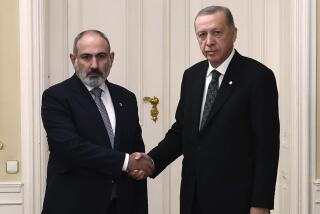Armenians Recall Genocide by Turks
- Share via
When George Apelian knocked at the door of the Turkish Consulate on Wilshire Boulevard on Friday, no one answered. He knocked again, rang the bell, and finally, pounded with his fist.
“It’s April 24,” he said in frustration. “We are here again.”
For Armenians like Apelian, April 24 is the Day of Remembrance for the genocide of Armenians by the Ottoman Turks. Armenians say 1.5 million of their people were killed beginning in 1915, but the modern Turkish government has refused to recognize the slaughter.
While a crowd of several hundred demonstrated outside the consulate in Hancock Park, Apelian slipped a folder under the consulate door. It contained demands that Turkey acknowledge the killings.
Fourteen miles away and a few hours later, about 4,000 Armenians gathered in a Montebello park to hear Gov. George Deukmejian, himself an Armenian, explain why recognition of “the forgotten genocide” is important.
“It is our responsibility as survivors, as Armenians, and as freedom-loving Americans, to see that this crime against humanity is never forgotten and to ensure that it is never repeated,” Deukmejian told the crowd, which included a handful of aging survivors.
“With this annual observance, we ensure that the Turkish government cannot hide the truth about this atrocity. They can lie, but they cannot hide.”
An attempt by reporters to get a response from the Turkish Consulate on Friday was unsuccessful. A woman answered the phone in mid-afternoon and said no one was available.
However, David Erbas-White, spokesman for the American-Turkish Assn. of Southern California, a cultural group, said: “The Armenians were not the victims of a genocide. They were the victim of wars (World War I and a civil war within the Ottoman Empire), as were 2.5 million Moslems who died.”
Erbas-White estimated that 600,000 Armenians died from the combined effects of famine and war. “We would like all of the facts to be brought out, not just one side,” he said.
At the Armenian Martyrs Monument in Montebello, Deukmejian received the enthusiastic applause of the audience when he called on President Reagan and Congress to adopt a resolution recognizing that genocide occurred.
Reagan has angered Armenian community leaders by refusing to support April 24 as a national day of remembrance, saying that a joint congressional resolution to that effect might damage relations with Turkey, a NATO ally.
But Kerop Arakelian, 77, remembered when things were different.
Arakelian, who said he was a genocide survivor, displayed a photograph he took 18 years ago of Reagan, when he was governor of California, sitting beside two Armenian religious leaders at the same monument.
At that time, Arakelian said, Reagan spoke at a remembrance day ceremony and embraced the genocide as fact.
Arakelian said he was a boy of about 6 years old when the genocide began.
He recalled that he and his family were marched into the Syrian desert and that 37 of his relatives, including his younger brother, died at the hands of the Turks.
He said he watched as his fellow Armenians were forced to dig their own graves and as Turks cut off the fingers of dead Armenians to remove their rings.
‘With My Own Eyes’
“I saw this with my own eyes,” he said.
Rep. Richard Lehman (D-Sanger), who followed Deukmejian to the podium and is sponsoring the congressional resolution, said it has been defeated in each of the last four years because of an “expensive, high-stakes” lobbying campaign mounted by the Turkish government.
“For the last five years,” Lehman said, “Turkish officials have visited members of Congress and provided free trips for them to Ankara and Istanbul. They have thrown lavish parties at the Turkish Embassy and purchased full-page newspaper ads.”
Deukmejian, who has said his aunt died in the genocide, called on the crowd, gathered under a huge tent in the hot sun, to keep alive memory of the massacre.
“To forget is to dishonor our ancestors,” he said. “To forget is to allow the tyrants to escape the judgment of history. To forget is to tempt the tyrants of the future.”
More to Read
Sign up for Essential California
The most important California stories and recommendations in your inbox every morning.
You may occasionally receive promotional content from the Los Angeles Times.










